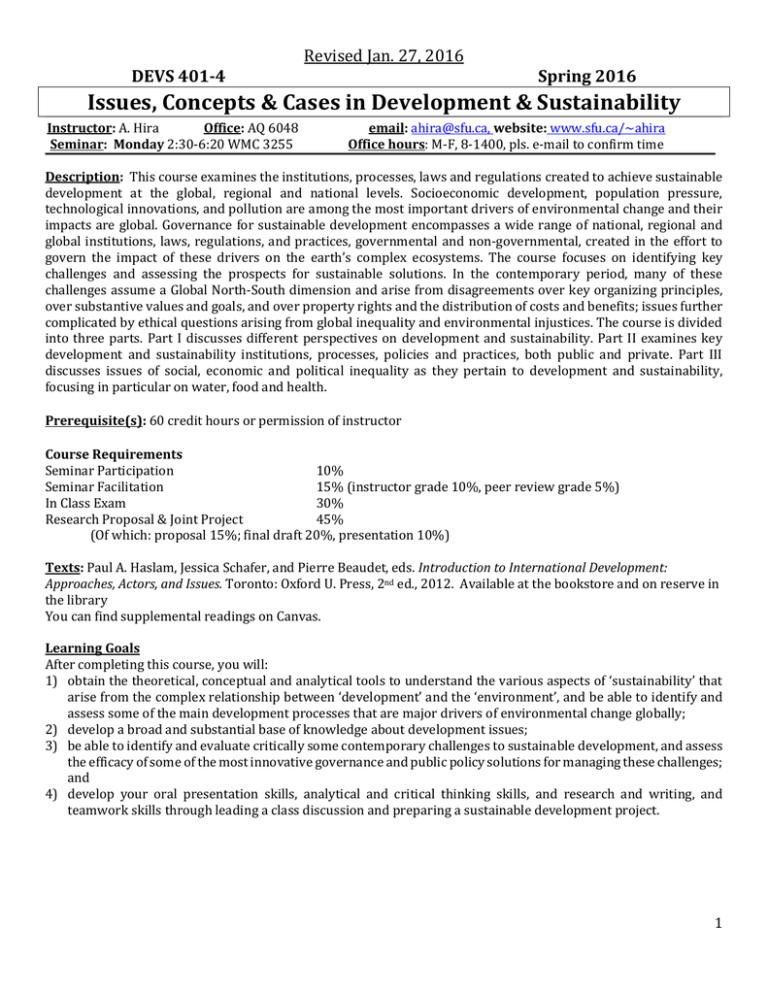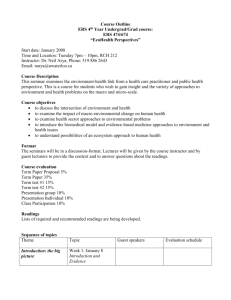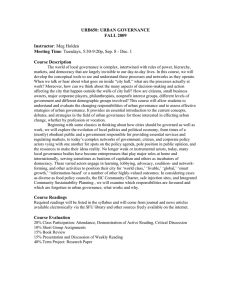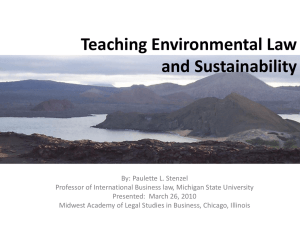Issues, Concepts & Cases in Development & Sustainability DEVS 401-4
advertisement

DEVS 401-4 Revised Jan. 27, 2016 Spring 2016 Issues, Concepts & Cases in Development & Sustainability Instructor: A. Hira Office: AQ 6048 Seminar: Monday 2:30-6:20 WMC 3255 email: ahira@sfu.ca, website: www.sfu.ca/~ahira Office hours: M-F, 8-1400, pls. e-mail to confirm time Description: This course examines the institutions, processes, laws and regulations created to achieve sustainable development at the global, regional and national levels. Socioeconomic development, population pressure, technological innovations, and pollution are among the most important drivers of environmental change and their impacts are global. Governance for sustainable development encompasses a wide range of national, regional and global institutions, laws, regulations, and practices, governmental and non-governmental, created in the effort to govern the impact of these drivers on the earth’s complex ecosystems. The course focuses on identifying key challenges and assessing the prospects for sustainable solutions. In the contemporary period, many of these challenges assume a Global North-South dimension and arise from disagreements over key organizing principles, over substantive values and goals, and over property rights and the distribution of costs and benefits; issues further complicated by ethical questions arising from global inequality and environmental injustices. The course is divided into three parts. Part I discusses different perspectives on development and sustainability. Part II examines key development and sustainability institutions, processes, policies and practices, both public and private. Part III discusses issues of social, economic and political inequality as they pertain to development and sustainability, focusing in particular on water, food and health. Prerequisite(s): 60 credit hours or permission of instructor Course Requirements Seminar Participation 10% Seminar Facilitation 15% (instructor grade 10%, peer review grade 5%) In Class Exam 30% Research Proposal & Joint Project 45% (Of which: proposal 15%; final draft 20%, presentation 10%) Texts: Paul A. Haslam, Jessica Schafer, and Pierre Beaudet, eds. Introduction to International Development: Approaches, Actors, and Issues. Toronto: Oxford U. Press, 2nd ed., 2012. Available at the bookstore and on reserve in the library You can find supplemental readings on Canvas. Learning Goals After completing this course, you will: 1) obtain the theoretical, conceptual and analytical tools to understand the various aspects of ‘sustainability’ that arise from the complex relationship between ‘development’ and the ‘environment’, and be able to identify and assess some of the main development processes that are major drivers of environmental change globally; 2) develop a broad and substantial base of knowledge about development issues; 3) be able to identify and evaluate critically some contemporary challenges to sustainable development, and assess the efficacy of some of the most innovative governance and public policy solutions for managing these challenges; and 4) develop your oral presentation skills, analytical and critical thinking skills, and research and writing, and teamwork skills through leading a class discussion and preparing a sustainable development project. 1 _____________________________________________________________________________________ Explanation of Course Requirements Please read the following very carefully Participation: (10%) 10% of your course grade is based on your contribution to class discussions. The key to effective participation is not merely the quantity or frequency of your comments/questions, but the quality of those contributions. Seminar Facilitation: (15%) This is a GROUP assignment. Each group is responsible for leading one class discussion during the course. You will notify the professor of which question you would like to answer and choices will be assigned on a first come, first served basis. For each topic there will be questions based on the readings. You will work as a group to answer the question(s) clearly and unambiguously and draw explicitly on the relevant readings. You should also plan how to make the class interactive – e.g., using videos, playing a game, etc. Do not merely summarize the readings. It may be necessary to draw on the recommended readings to answer questions effectively. Develop an argument based on your knowledge of the relevant issues, concepts, themes and examples raised by the readings. Students who are not presenting that week are expected to come to class with their own thoughts on the questions and issues of debate, and prepared to raise/answer questions. Each member of the group will also provide a grade evaluating the other members’ contribution. In Class Examination: (30%) You will complete an in class examination after the foundational classes of the course to test your basic knowledge about development. The exam will be based on the textbook and instructor lectures. Research Proposal and Project: (45%) of which, proposal 15%, essay 20%, presentation 10% This is a GROUP assignment. This assignment requires that you think critically about a particular issue or issues in development and sustainability. The choice of topic for the essay is open, but it must be a contemporary issue reflecting the core themes of this course. The research essay assignment is divided into two stages. First is the research proposal (5 pages). Here, you will articulate and justify the subject of your research project, explaining why the issues are significant. The proposal will be evaluated and the comments are to be incorporated into the final research project. The second stage is the first draft of the research project, which builds on the research proposal (15 pages). Evaluation of the final research project will reflect the extent to which you have responded to the suggestions made on the proposal. Students will be given the opportunity to write a second draft of the research essay, responding to comments made on the first draft. The research proposal is due in class by Feb 15 (session 6), and the final research project Apr 4 (session 13). Each member of the group will also provide a grade evaluating the other members’ contribution. NOTE: Late penalties: Assignments are due at the beginning of class. Projects handed in after due-dates will incur a late penalty that accumulates over time. Only valid medical notes will be accepted as an excuse. Instructions for the research proposal and essay are posted on the instructor’s website and will be reviewed in class. How Each Class is Organised (to be adjusted as required, incl. for breaks) 14:30-15:30 lecture 15:30-16:30 student seminar presentation 16:30-18:20 guest speaker 2 Summary of Weekly Seminar Topics and Assignment due-dates PART I HISTORY, THEMES & PERSPECTIVES Wk 1 Jan 11: Introduction: History and Context of ‘Development’ & ‘Sustainability’; Perspectives & Theories of Development (Andy Hira) Wk 2 Jan 18: Discussion of Group Projects (June Francis, Beedie School of Business & DEVS) Wk 3 Jan 25: Business and Sustainable Development (June Francis) students: Olivia, Nick and Usi PART II INSTITUTIONS, PROCESSES, POLICIES & PRACTICES Wk 4 Feb 1: Role of the State in Development, Military States and Sustainable Development (Bob Anderson Communications & DEVS) Wk 5 Feb 8: Family Day No classes; Feb 10-14 Reading Break – No classes Wk 6 Feb 15: Perspectives on Sustainable Development, (Duncan Knowler, REM & DEVS), students: Daniel, Brandon, and Michael RESEARCH PROPOSAL DUE Wk 7 Feb 22: Information, Communications, Technology & Development (Katherine Reilly, Communications), student: Maria PART III PEOPLE, SOCIETY, ECONOMY & POLITY PART IV STUDENT PRESENTATIONS OF RESEARCH PROJECTS Wk 8 Feb. 29: Public Health & Sustainable Development (Carl Lowenberger Biosciences/Entomology), students: Cara, Melanie, and Michael Wk 9. Mar 7: International Governance and Sustainable Development (Ted Cohn, Political Science), students: Emma, Keanna, Bonan Wk 10 Mar 14: Group Project Workshop Wk 11 Mar 21: Gender, Class, Race and Sustainable Development (Gerardo Otero, SIS) student: Kaschelle In Class Examination Mar 28: Easter No classes WK 12 Apr 4: Food, Water, and Sustainable Development, John Clague (Earth Sciences & DEVS), students: Hannah, Stephanie, Sterling, and Elizabeth Wk 13 Apr 11: Student Presentations & FINAL PROJECT DUE --------------------------------------------------------------------------------------------------------------------------------------------------- Research Resources Research Journals Biodiversity and Conservation Ethics and International Affairs Geographic Journal Global Governance Global Environmental Change Global Environmental Politics Human Rights Quarterly International Environmental Agreements International Organization International Studies Quarterly Journal of Environmental Law Journal of Human Development Journal of International Development Organization and Environment Progress in Development Studies Population Research and Policy Review Policy and Society Sustainable Development Third World Quarterly World Development Useful Electronic Resources International Institute for Sustainable Dev (www.iisd.org) United Nations Environment Program (www.unep.org) United Nations Development Program (www.undp.org) World Bank (www.worldbank.org) Intergovernmental Panel on Climate Change (www.ipcc.ch) United Nations Treaty Series (treaties.un.org) Commission on Human Security (UN) (www.humansecurity-chs.org) 3 DEVS 401 SCHEDULE OF WEEKLY SEMINARS Spring 2015 Part I. History, Themes & Perspectives (3 sessions) Session 1 (Jan 11) Course Introduction – History & Context of Development & Sustainability Historically, what has been the promise of development and what has been the reality, including the experience of those to whom the promise was offered? How has the meaning of development and sustainability changed over time, and why. What does development mean to researchers, and to its subjects or objects? Why talk about development and sustainability. Choice of seminar presentation; Hira Lecture on Definition and Perspectives/Theories 16:3018:20 Required readings: * Haslam chapters 1-2, 13 Recommended: * Rist, G. (2014) The History of Development: From Western Origins to Global Faith, (London: Zed) Ch 1, HD 78 R5713 2014 * Sen, Amartya (1999). Development as Freedom, (NY: Alfred Knopf) Chapter 1. HD 75 S455 1999 * Ramesh Thakur et al, (2005) International Commissions and the Power of Ideas, Tokyo, UN University Press, Ch 1. on-line through library catalogue. Session 2 (Jan 18] Perspectives/Theories of Development A survey of the major theories of development since 1945 and the intellectual sources on which they are based. Questions: How is development defined and how has that definition changed over time? Which of the leading theories do you think provides the most compelling way to look at development? Review of seminar presentation choice, Discussion of course projects (June Francis, 15:3018:20) Required readings: * Haslam, chapters 3-4, 6 Recommended: * Frans J. Schurman, (2000). “Paradigms Lost, Paradigms Regained? Development Studies in the Twenty-First Century.” Third World Quarterly, 21, 1: 7-20. * Arturo Escobar, “The Making and Unmaking of the Third World through Development” in M. Rahnema and V. Bawtree eds., The Post-Development Reader (Halifax: Fernwood, 1997) pp. 85-91 GN 448.2 P67 1997 * Jane L Parpart (1995), “Deconstructing the Development ‘Expert’: Gender, Development and the ‘Vulnerable Groups’,” in M. Marchand and J. L. Parpart, eds, Feminism, Postmodernism, Development (London & NY: Routledge) pp. 221-243, on-line * Jan Neverdeen Pierterse, (1998) “My Paradigm or Yours? Alternative Development, Post-Development, and Reflexive Development,” Development and Change, 29:342-73. Session 3 (Jan 25) Non-State Actors & Sustainable Development We discuss the role of business corporations, NGOs and other non-state actors. Questions: What is and should be the relationship among states, IOs, MNCs and NGOs? How can a development agency be effective but still work within existing political and economic constraints? Guest Speaker: June Francis (Business and DEVS), Business and Development Required readings: * Haslam, 10-11 4 Recommended: * Stefanie Beninger and June P. Francis (2015), “Appropriation of Community Knowledge: Towards an Understanding of the Potential Harms and Benefits,” Journal of Macromarketing, 1-15. * Peter Newell (2008), “Civil Society, Corporate Accountability, and the Politics of Climate Change,” Global Environmental Politics, 8, 3: 122-153 * Susan Park (2005), “How Transnational Environmental Advocacy Networks Socialize International Financial Institutions: A Case Study of the International Finance Corporation,” Global Environmental Politics 5, 4: 95119 * Agni Kalfagianmi (2014), “Addressing the Global Sustainability Challenge: The Potential & Pitfalls of Private Governance from the Perspective of Human Capabilities,” Journal of Business Ethics, 122: 307-320 * Patrick Bernhagen (2008), “Business and International Environmental Agreements: Domestic Sources of Participation and Compliance by Advanced Industrialized Democracies,” Global Environmental Politics, 8: 78-110 * M. Sornarajah (2006), “A Law for Need or a Law for Greed? Restoring the Lost Law in the International law of Foreign Investment,” International Environmental Agreements, 6:329–357 Part II Session 4 (Feb 1) INSTITUTIONS, PROCESSES, POLICIES & PRACTICES Role of the State in Development We discuss the central debate about the role of states in development? What is the appropriate balance between states and markets? Questions: What are the appropriate areas for the state to lead and follow in? Should the state be involved in economic activities, if so, which ones? What does the experience of history tell us about the state’s role? (Guest speaker: what can be done to mitigate human rights abuses by military regimes and aid democratic transition?) Guest Speaker: Bob Anderson (Communications) Required Readings: Haslam Chapters 7, 12 & 22 Recommended: * Anderson, Robert (1991). “American Interests, Foundation Planning, and IRRI’s Origins” in Rice Science and Development Politics, Oxford University Press, SB 191 R5 A7599 1991 * Hira, (2007) An East Asian Model for Latin American Success Ashgate, c.s 2, 3, & 5 Wk 5 Feb 8 Family Day No classes; Feb 10-14 Reading Break – No classes Session 6 (Feb 15) Perspectives on Sustainable Development We discuss different perspectives on the relationship between development, environment, and sustainability, and assess their implications for governance. Questions: Is there an inherent conflict between environmental priorities and economic growth? What can be done to find the right balance between them? RESEARCH PROPOSAL DUE Guest Lecturer: Duncan Knowler (REM & DEVS) Required Readings: * Haslam, c. 17-18 Recommended: * Mark Roseland (with Lena Soots) (2007), “Strengthening Local Economies,” ch 8 in State of the World 2007, HC 59.15 S7333 2007. *Agyeman, Julian, R. D. Bullard and Bob Evans (eds.) (2003) Just Sustainabilities: Development in an Unequal World (London: Earthscan) Introduction and Conclusion, on-line. *Paul Wapner, (2014), “The Changing Nature of Nature,” Global Environmental Politics 14, 4: 36-54 *Heather Smith, (2005) “World Commission on Environment and Development: Ideas and Institutions Intersect,” in R. Thakur et al, International Commissions and the Power of Ideas, (Tokyo, UN University Press), pp. 76-98, on-line. Session 7 (Feb 22) Information, Communications, Technology and Development 5 We discuss the way that new technologies such as mobile phones and the internet demonstrate tremendous potential for development. We discuss the general role of technology and development. Questions: What does globalization through the development of lower communications costs mean for developing countries? Does it give them an opportunity to move ahead or does it leave them behind? Do new technologies offer the poor opportunities that they would not otherwise have, such as electronic payment through cell phones, bypassing banks? If so, how much can it help the poor to improve their incomes? How much and in what ways should developing countries promote technologies vs. basic human needs? Guest Speaker: Katherine Reilly, Communications, Communications and Development Return and Discussion of Research Proposals Part III. People, Society & Sustainable Development Session 8 (Feb. 29) Public Health & Sustainable Development We discuss issues of global and public health, including challenges from both a scientific and policy perspective. Question: What are the primary challenges for improving health in development? What should be the role of external public, private, and internal agents? When do crises become a global concern and when should they? How can a sustainable system be created? Guest Speaker: Carl Lowenberger (Biosciences/Entomology) Required readings: Haslam, c.s 19, 20 Recommended: *Janes, Craig (2006) “Poor medicine for Poor People: Assessing the Impact of Neoliberal Reform on Health Care Equity in a post-Socialist Context,” Global Public Health * Caroline Thomas and Martin Weber, “The Politics of Global Health Governance: Whatever Happened to “Health for All by the Year 2000”? Global Governance 10, 2 (2004) 187–205 * Andy Hira, The political economy of the global pharmaceutical industry: Why the poor lack access to medicine and what might be done about it, International Journal of Development Issues, 8.2 (2009): 84-101. Session 9 (March 7) International Governance and Sustainability We discuss the global institutional and legal framework created by states/national governments (i.e., public authority) for global governance and sustainable development, focusing on the IMF, the World Bank, and the United Nations system. We also discuss some key challenges behind environmental agreements, such as climate change. Questions: What is the appropriate role between IOs and states? To what extent can IOs pressure states and vice versa? What are the challenges to get enforcement of global agreements on trade, environment, and human rights, and how can they be overcome? Guest Speaker: Ted Cohn, Political Science Required Readings: * Haslam, c.s 8-10 Recommended: * Theodore H. Cohn, Global Political Economy: Theory and Practice, Ch 10 & 11, HF 1359 C654 2012 * Hira, Anil and Trevor Parfitt. Development Projects for a New Millenium. Westport: Greenwood, c.1. * Thomas G. Weiss (2000),“Governance, Good Governance, and Global Governance: Conceptual and Actual Challenges,” Third World Quarterly 21, 4: 785-814 * Steinar Andersen and E. Hey (2005), “The Effectiveness and Legitimacy of International Environmental Institutions,” International Environmental Agreements, 5: 211–226 * Philip H. Pattberg (2007), “Introduction: From Public to Private Governance,” in Private Institutions of Global Governance: The New Politics of Environmental Sustainability, (Cheltenham, UK: Edward Elgar) pp. 1-30, GE 170 P746 2007 * Rita Abrahamsen (2004), “The Power of Partnerships in Global Governance,” Third World Quarterly 25, 8: 1453-1467 Session 10 (March 14) Group Project Workshop Project Workshop 6 Session 11 (Mar 21) Gender, Race Class and Development We discuss patterns of social, economic and political differentiation and stratification, and their relationship with issues of sustainability and development. Questions: What are the roots of differences among humans and how can they be overcome? How do we move from formal equality to real equality? How do you respond to cultural differences based on religion that discriminate against some parts of the population? Use a concrete case to make your points. In class examination Required readings: Haslam, c.s 5, 24 & 25 Recommended: * Peter Newell (2005), “Race, Class and the Global Politics of Environmental Inequality,” Global Environmental Politics 5, 3: 70-94 * I. Anguelovski & J.M. Alier (2014), “The Environmentalism of the Poor Revisited: Territory & Place in Disconnected Glocal Struggles,” Ecological Economics, 102; 167-176. *Rathgeber, Eva (1990). "WID, WAD, GAD: Trends in Research and Practice," Journal of Developing Areas, Vol. 24, pp. 489-502. * Shara G. Neidell (1998), “Women’s Empowerment as a Public Problem: A Case Study of the 1994 International Conference on Population and Development,” Population Research and Policy Review 17: 247–260 * Agyeman, Julian, R. D. Bullard and Bob Evans (eds.) (2003) Just Sustainabilities: Development in an Unequal World (London: Earthscan) Introduction and Conclusion (same as session 3 above), on-line PART IV STUDENT PRESENTATIONS Mar. 28: Easter Break – No classes Session 12 (Apr. 4) Food, Water, and sustainable Development We discuss environmental management considering resource characteristics and constraints. Question: What is the carrying capacity for advanced Western lifestyles? What adjustments can and should be made? How do we determine the limitations and values of natural and biological resources? What are the best approaches to resource management to maximize their use while still keeping them sustainable? Return and Discussion of Exams Development project negotiation simulation- Chalillo Dam Guest Speaker: John Clague (Earth Science & Devs) Recommended: * Allouche, Jeremy (2011), “The Sustainability and Resilience of Global Water and Food Systems,” Food Policy 36: S3– S8 * Joyeeta Gupta & L. Lebel (2010), “Access and Allocation in Earth System Governance: Water and Climate Change Compared,” International Environmental Agreements, 10: 77-395 * Mark Zeitoun and Naho Mirumachi (2008), “Transboundary Water Interaction: Reconsidering Conflict and Cooperation,” International Environmental Agreements, 8:297-316 * Marco Schouten and K. Schwartz (2006), “Water as a Political Good: Implications for Investments,” International Environmental Agreements, 6:407–421 *Lena Partzsh & R. Ziegler (2011), “Social Entrepreneurs as Change Agents: A Case Study on Power and Authority in the Water Sector,” International Environmental Agreements, 11:63-83 Session 13 (Apr. 11) Student Presentations FINAL DRAFT OF RESEARCH PROJECT DUE 7




